Presidential elections in Brazil
Direct presidential elections are held in Brazil as part of the general elections every four years, typically in October. The current electoral law provides for a two-round system in which a candidate must receive more than 50% of the vote to win in the first round; if no candidate passes the 50% threshold, a run-off is held between the top two candidates.[1] Every candidate has a running mate who disputes the post of vice-president; prior to 1966, the vice-president was elected separately.
 |
|---|
| This article is part of a series on the politics and government of Brazil |
|
|
The country has held presidential elections since 1891, spanning over a period of several different republican governments and national constitutions.
This list shows the winner of the elections and the runner-up.
Old Republic
According to the 1891 Constitution, the right to vote was restricted to men over 21 years old who were not illiterate, homeless or enlisted-rank soldiers.[2] The elections for president and vice-president were held separately and the same person could be a candidate for both.
Overall, only a small portion of the population voted.[3] Since coronelism was common, the colonel elites often persuaded people to vote for certain candidates.
1891
The very first president was elected indirectly by the Congress.
| Winner | Runner-up | |
|---|---|---|
| Candidate | .jpg.webp) Marshal Deodoro da Fonseca |
 Prudente de Morais (PRP) |
| Votes | 129 (55.13%) |
97 (41.45%) |
- Other candidates: Floriano Peixoto, Saldanha Marinho, José Higino Duarte Pereira
1894
From 1894 on, elections were held every four years.
| Winner | Runner-up | |
|---|---|---|
| Candidate |  Prudente de Morais (PR Federal) |
 Afonso Pena (PRM) |
| Votes | 276,583 (80.12%) |
38,291 (11.09%) |
- Other candidates: José Cesário de Faria Alvim, Ruy Barbosa, José Luiz de Almeida Couto, Lauro Sodré
1898
| Winner | Runner-up | |
|---|---|---|
| Candidate |  Campos Sales (PRP) |
 Lauro Sodré (PR Federal) |
| Votes | 420,286 (90.93%) |
38,929 (8.42%) |
- Other candidates: Júlio de Castilhos, Dionísio Evangelista de Castro Cerqueira
1902
| Winner | Runner-up | |
|---|---|---|
| Candidate | 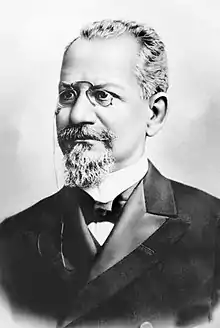 Rodrigues Alves (PRP) |
 Quintino Bocaiuva (PRF) |
| Votes | 592,039 (91.69%) |
42,542 (6.59%) |
- Other candidates: Ubaldino Fontoura, Júlio de Castilhos
1906
| Winner | Runner-up | |
|---|---|---|
| Candidate |  Afonso Pena (PRM) |
 Lauro Sodré (PR Federal) |
| Votes | 288,285 (97.92%) |
4,865 (1.65%) |
- Other candidates: Ruy Barbosa, Manuel Ferraz de Campos Salles, Severino dos Santos Vieira, others
1910
| Winner | Runner-up | |
|---|---|---|
| Candidate | .jpg.webp) Marshal Hermes da Fonseca (PRC) |
 Ruy Barbosa (PRP) |
| Votes | 403,867 (64.35%) |
222,822 (35.51%) |
- Other candidates: Venceslau Brás
1914
| Winner | Runner-up | |
|---|---|---|
| Candidate |  Venceslau Brás (PRM) |
 Ruy Barbosa (PRL) |
| Votes | 532,107 (91.59%) |
47,782 (8.22%) |
- Other candidates: José Gomes Pinheiro Machado
1918
| Winner | Runner-up | |
|---|---|---|
| Candidate |  Rodrigues Alves (PRP) |
 Nilo Peçanha (PRF) |
| Votes | 386,467 (99%) |
1,768 (0.45%) |
- Other candidates: Ruy Barbosa
1919
Since Rodrigues Alves, the President-elect, caught the Spanish flu before taking office, a new election was held in 1919.
| Winner | Runner-up | |
|---|---|---|
| Candidate | .jpg.webp) Epitácio Pessoa (PRM) |
 Ruy Barbosa (PRP) |
| Votes | 286,373 (70.96%) |
116,414 (28.85%) |
- Other candidates: Altino Arantes Marques
1922
| Winner | Runner-up | |
|---|---|---|
| Candidate | .jpg.webp) Artur Bernardes (PRM) |
 Nilo Peçanha (PRF) |
| Votes | 466,877 (59.46%) |
317,714 (40.46%) |
- Other candidates: Urbano Santos
1926
| Winner | Runner-up | |
|---|---|---|
| Candidate | .jpg.webp) Washington Luís (PRP) |
 Joaquim Assis Brasil |
| Votes | 688 528 (99.70%) |
1,116 (0.16%) |
- Other candidates: Fernando de Melo Viana
1930
| Winner | Runner-up | |
|---|---|---|
| Candidate |  Júlio Prestes (PRP) |
.jpg.webp) Getúlio Vargas (AL) |
| Votes | 1 091 709 (59.39%) |
742 794 (40.41%) |
- Other candidates: Minervino de Oliveira
Vargas Era
With the Revolution of 1930, the country was governed until 1930 by a military triumvirate, while Getúlio Vargas was the de facto president (officially President of the Provisional Government).[4] The new Constitution predicted that the first president would be chosen by the Congress in an indirect election.
1934
| Winner | Runner-up | |
|---|---|---|
| Candidate |  Getúlio Vargas (AL) |
 Borges de Medeiros (PRR) |
| Votes | 175 (70.58%) |
59 (23.79%) |
- Other candidates: Pedro Aurélio de Góis Monteiro, Protógenes Guimarães, Raul Fernandes, Artur Bernardes, Plínio Salgado, Antônio Carlos Ribeiro de Andrada, Afrânio de Melo Franco, Oscar Weinscheck, Paim Filho, Levi Carneiro
A second election was scheduled for 1938, but it did not happen due to the 1937 Revolution, under which another Constitution was written.
Second Republic
After Vargas was forced to resign in 1945, a new state was born under a democratic constitution written in 1946. The new law predicted direct elections every 5 years for both president and vice-president and women could now vote.
1945
| Winner | Runner-up | |
|---|---|---|
| Candidate |  Marhsal Eurico Gaspar (PSD) |
 Air Marshal Eduardo Gomes (UDN) |
| Votes | 3,251,507 (55.39%) |
2,039,341 (34.74%) |
- Other candidates: Yedo Fiúza (PCB), Rolim Teles (PNA)
1950
| Winner | Runner-up | |
|---|---|---|
| Candidate |  Getúlio Vargas (PTB) |
 Air Marshal Eduardo Gomes (UDN) |
| Votes | 3,849,040 (48.73%) |
2,342,384 (29.66%) |
- Other candidates: Cristiano Machado (PSD), João Mangabeira (PSB)
1955
| Winner | Runner-up | |
|---|---|---|
| Candidate |  Juscelino Kubitschek (PSD) |
 Marshal Juarez Távora (PDC) |
| Votes | 3,077,411 (35.68%) |
2,610,462 (30.27%) |
- Other candidates: Adhemar de Barros (PSP), Plínio Salgado (PRP)
1960
| Winner | Runner-up | |
|---|---|---|
| Candidate | 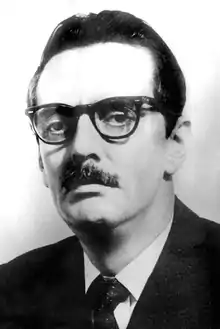 Jânio Quadros (PTN) |
 Marshal Henrique Teixeira Lott (PSD) |
| Votes | 5,636,623 (48.26%) |
3,846,825 (32.94%) |
- Other candidates: Adhemar de Barros (PSP)
Military rule
With the 1964 military coup d'état, the direct democracy ended and presidents (who were all members of military, except for the last one) were now elected by the Congress.[5] The interval between elections was irregular.
1964
| Winner | Runner-up | Third place | |
|---|---|---|---|
| Candidate |  Marshal Castelo Branco |
 Marshal Juarez Távora (PDC) |
 Marshal Gaspar Dutra (PSD) |
| Votes | 361 (98.63%) |
3 (0.82%) |
2 (0.54%) |
1966
With the two-party system, only ARENA and MDB could dispute elections. President and vice-president were now part of the same ticket. The 1966 and 1969 elections had only one candidate.
| Winner | Runner-up | |
|---|---|---|
| Candidate |  Marshal Costa e Silva (ARENA) |
none |
| Votes | 294 (100%) |
– |
1969
First election under the 1967 Constitution.
| Winner | Runner-up | |
|---|---|---|
| Candidate |  General Emílio Médici (ARENA) |
none |
| Votes | 293 (100%) |
– |
1974
| Winner | Runner-up | |
|---|---|---|
| Candidate |  General Ernesto Geisel (ARENA) |
 Ulysses Guimarães (MDB) |
| Votes | 400 (84.03%) |
76 (15.97%) |
1978
| Winner | Runner-up | |
|---|---|---|
| Candidate | 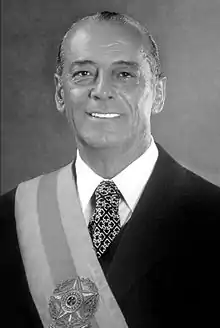 General João Figueiredo (ARENA) |
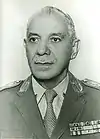 General Euler Monteiro (MDB) |
| Votes | 355 (61.20%) |
225 (38.79%) |
1985
The two-party system ended in 1979 and many other parties were created. This was the last election under the military regime.
| Winner | Runner-up | |
|---|---|---|
| Candidate |  Tancredo Neves (MDB) |
 Paulo Maluf (PDS) |
| Votes | 480 (72.73%) |
180 (27.27%) |
New Republic
Under the current Constitution enacted in October 1988, elections are held every four years (except for the first one, which was held five years before the second to match the centenary of the Proclamation of the Republic) and citizens elect a ticket for both president and vice-president. Voting is mandatory for men and women between 18 and 70 years old who are not illiterate, and optional for people aged 16–17, over 70, and illiterates.[1]
1989
| Winner | Runner-up | |
|---|---|---|
| Candidate |  Fernando Collor (PRN) |
 Lula (PT) |
| Votes (first round) |
20,611,011 (30.47%) |
11,622,673 (17.18%) |
| Votes (second round) |
35,089,998 (53.03%) |
31,076,364 (46.97%) |
- Other candidates: Leonel Brizola (PDT), Mário Covas (PSDB), Paulo Maluf (PDS), Guilherme Afif Domingos (PL), Ulysses Guimarães (PMDB), Roberto Freire (PCB), Aureliano Chaves (PFL), Ronaldo Caiado (PSD), Affonso Camargo Neto (PTB), Enéas Carneiro (PRONA), Fernando Gabeira (PV), Celso Brant (PMN), Antônio dos Santos Pereira (PP), Manoel de Oliveira Horta (PDCdoB), Marronzinho (PSB), Paulo Gontijo (PP), Zamir José Teixeira (PCN), Lívia Maria de Abreu (PN), Eudes Oliveira Mattar (PLP)
1994
| Winner | Runner-up | |
|---|---|---|
| Candidate |  FHC (PSDB) |
 Lula (PT) |
| Votes (first round) |
34,314,961 (54.24%) |
17,112,127 (27.07%) |
| Votes (second round) |
– | – |
- Other candidates: Enéas Carneiro (PRONA), Orestes Quércia (PMDB), Leonel Brizola (PDT), Espiridão Amin (PPR), Carlos Antônio Gomes (PRN), Hernani Fortuna (PSC)
1998
| Winner | Runner-up | |
|---|---|---|
| Candidate | .jpg.webp) FHC (PSDB) |
 Lula (PT) |
| Votes (first round) |
35,936,540 (53.06%) |
21,475,218 (31.71%) |
| Votes (second round) |
– | – |
- Other candidates: Ciro Gomes (PPS), Enéas Carneiro (PRONA), José Maria Eymael (PSDC), José Maria de Almeida (PSTU), Alfredo Sirkis (PV), Sergio Bueno (PSC), Thereza Ruiz (PTN), João de Deus Barbosa de Jesus (PTdoB), Vasco Azevedo Neto (PSN), Ivan Frota (PMN)
2002
| Winner | Runner-up | |
|---|---|---|
| Candidate |  Lula (PT) |
 José Serra (PSDB) |
| Votes (first round) |
39,455,233 (46.44%) |
19,705,445 (23.19%) |
| Votes (second round) |
52,793,364 (61.27%) |
33,370,739 (38.72%) |
- Other candidates: Anthony Garotinho (PSB), Ciro Gomes (PPS), José Maria de Almeida (PSTU), Rui Costa Pimenta (PCO)
2006
| Winner | Runner-up | |
|---|---|---|
| Candidate |  Lula (PT) |
 Geraldo Alckimin (PSDB) |
| Votes (first round) |
46,662,365 (48.61%) |
39,968,369 (41.64%) |
| Votes (second round) |
58,295,042 (60.83%) |
37,543,178 (39.17%) |
- Other candidates: Heloísa Helena (PSOL), Cristovam Buarque (PDT), Luciano Bivar (PSL) José Maria Eymael (PSDC), Rui Costa Pimenta (PCO), Ana Maria Rangel (PRP)
2010
| Winner | Runner-up | |
|---|---|---|
| Candidate |  Dilma Rousseff (PT) |
 José Serra (PSDB) |
| Votes (first round) |
47,651,434 (46.91%) |
33,132,283 (32.61%) |
| Votes (second round) |
55,752,529 (56.05%) |
43,711,388 (43.95%) |
- Other candidates: Marina Silva (PV), Plínio de Arruda Sampaio (PSOL), Levy Fidelix (PRTB), José Maria de Almeida (PSTU), José Maria Eymael (PSDC), Rui Costa Pimenta (PCO), Ivan Pinheiro (PCB)
2014
| Winner | Runner-up | |
|---|---|---|
| Candidate |  Dilma Rousseff (PT) |
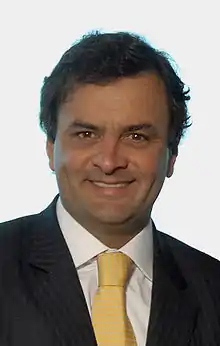 Aécio Neves (PSDB) |
| Votes (first round) |
43,267,668 (41.59%) |
34,897,211 (33.55%) |
| Votes (second round) |
54,501,118 (51.64%) |
51,041,155 (48.36%) |
- Other candidates: Marina Silva (PSB), Luciana Genro (PSOL), Eduardo Jorge (PV), Levy Fidelix (PRTB), Everaldo Pereira (PSC), José Maria Eymael (PSDC), José Maria de Almeida (PSTU), Mauro Iasi (PCB), Rui Costa Pimenta (PCO)
2018
| Winner | Runner-up | |
|---|---|---|
| Candidate | .jpg.webp) Jair Bolsonaro (PSL) |
.jpg.webp) Fernando Haddad (PT) |
| Votes (first round) |
49,276,990 (46.03%) |
31,342,005 (29.28%) |
| Votes (second round) |
57,782,731 (55.14%) |
47,017,752 (44.86%) |
- Other candidates: Ciro Gomes (PDT), Geraldo Alckimin (PSDB), Marina Silva (REDE), Cabo Daciolo (Patriota), Guilherme Boulos (PSOL), João Amoêdo (NOVO), José Maria Eymael (DC), Vera Lúcia (PSTU), João Vincente Goulart (PPL)
References
- Eleições 2018
- Brazilian Constitution of Brazil, 1891. Political Database of the Americas.
- Carvalho, José Murilo de (2001). Cidadania no Brasil: o longo caminho (11ª ed.). Rio de Janeiro, Brasil: Civilização Brasileira. p. 40. ISBN 978-85-200-0565-1.
- "A Revolução de 1930: Principais fatos da Revolução de 1930"
- Ato Institucional Nº 1, 9 de abril de 1964